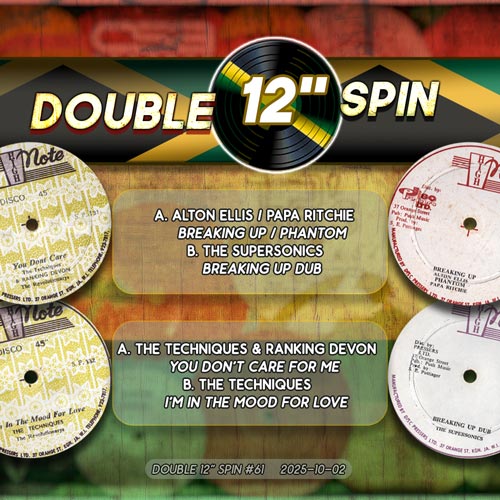
A. Alton Ellis/Papa Ritchie – Breaking Up/Phantom
B. The Supersonics – Breaking Up Dub
Label: High Note
Arthur “Duke” Reid, born on July 21, 1915, in Portland, Jamaica, was a multifaceted personality. Initially serving as a police officer, Reid transitioned into the music industry, becoming one of the most prominent figures in Jamaican music history. In the 1950s, he established ‘Reid’s Sound System’, which quickly gained popularity and became a dominant force in Kingston’s music scene, earning him the moniker ‘The Trojan’.
In the early 1960s, Reid founded the Treasure Isle label, named after his liquor store, and set up a recording studio above it. This move allowed him to have complete control over the production process, leading to the creation of some of Jamaica’s most iconic tracks. Under the Treasure Isle label, Reid produced hits for artists like Alton Ellis, The Paragons, Justin Hinds & The Dominoes, and The Techniques. His productions were characterized by their rich arrangements, created by Tommy McCook and His Supersonics, and the seamless fusion of ska, rocksteady, and early reggae riddims.
However, by the early 1970s, Reid’s health began to decline. Despite diagnosed with cancer, Reid continued to be involved in the music scene, collaborating with artists and producers. In 1974, recognizing his deteriorating condition, Reid made a significant decision that would impact the future of Jamaican music.
Sonia Pottinger, born in St. Thomas, Jamaica, was introduced to the music business by her husband, L.O. Pottinger, an engineer who had relative success as a producer in the mid-1960s. After his passing, Sonia took over the reins, establishing herself as a formidable force in the industry. She founded the High Note label, which became one of Jamaica’s most respected labels, known for its diverse roster of artists and high-quality productions.
In 1974, as Duke Reid’s health declined, he made the strategic decision to sell the Treasure Isle label to Sonia Pottinger. This acquisition was not just a business transaction; it was a passing of the torch from one music pioneer to another. Pottinger, with her keen business acumen and deep understanding of Jamaican music, took control of Reid’s extensive back catalogue.
Upon acquiring the Treasure Isle catalogue, Sonia Pottinger embarked on an ambitious reissue programme. Recognizing the evolving tastes of the Jamaican audience and the global interest in reggae music, she decided to release select tracks in a new format: the 12″ disco mix. This format allowed for extended versions of songs, incorporating dub elements and instrumental overdubs, catering to the growing demand for longer, more experimental tracks.
A. The Techniques & Ranking Devon – You Don’t Care
B. The Techniques – I’m In The Mood For Love
Label: High Note
The 12″ disco mixes were not mere reissues; they were reimaginations of classic songs. Pottinger worked closely with engineers and musicians to add new layers to the original recordings. The overdubs, often featuring prominent session musicians, gave the tracks a fresh sound while retaining their original charm.
One notable example of this reissue programme is the 12″ single featuring Alton Ellis’ ‘Breaking Up’. Originally recorded in 1968, the track was reissued in 1977 with added overdubs and a deejay cut by Papa Ritchie. This release exemplified Pottinger’s approach to blending the old with the new, preserving the essence of the original while introducing contemporary elements.
Similarly, The Techniques’ hits ‘You Don’t Care’ and ‘I’m In The Mood For Love’, both recorded in 1968, were reissued in the 12″ format. These tracks, known for their smooth harmonies and soulful melodies, were enhanced with overdubs by The Revolutionaries, a session group known for their contributions to reggae music. The inclusion of a deejay cut by Ranking Devon further enriched the release, showcasing the dynamic nature of the reggae genre during this period.
Sonia Pottinger’s reissue programme had a profound impact on the Jamaican music scene. By reintroducing classic tracks in a new format, she not only preserved the legacy of artists like Alton Ellis and The Techniques but also introduced their music to a new generation of listeners. The 12″ disco mixes became a staple in sound systems and dancehalls, bridging the gap between the traditional and contemporary sounds of reggae.
Furthermore, Pottinger’s efforts highlighted the importance of preserving Jamaica’s musical heritage. In an era where many artists and producers were focused on creating new material, Pottinger’s dedication to reissuing classic tracks ensured that the foundational sounds of Jamaican music were not forgotten. Her work underscored the notion that the past and present of reggae music are interconnected, with each influencing the other.
[These tracks were digitized directly from vinyl using a Technics SL-1210MK2 turntable equipped with an Ortofon cartridge. The recordings were captured in 24-bit/96kHz WAV format via SoundForge]
